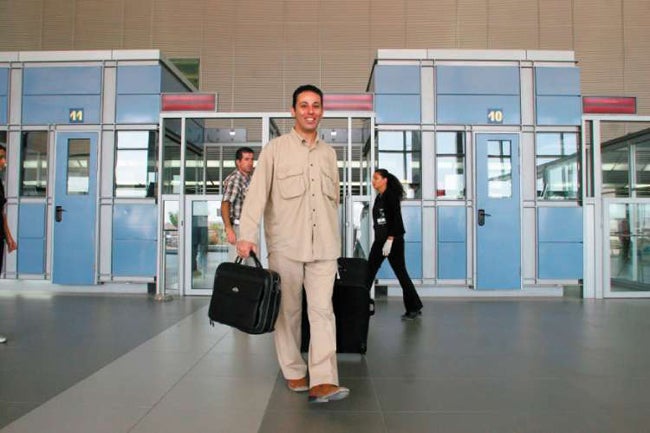After eight years, Gaza student walks to freedom and an education

Your support helps us to tell the story
From reproductive rights to climate change to Big Tech, The Independent is on the ground when the story is developing. Whether it's investigating the financials of Elon Musk's pro-Trump PAC or producing our latest documentary, 'The A Word', which shines a light on the American women fighting for reproductive rights, we know how important it is to parse out the facts from the messaging.
At such a critical moment in US history, we need reporters on the ground. Your donation allows us to keep sending journalists to speak to both sides of the story.
The Independent is trusted by Americans across the entire political spectrum. And unlike many other quality news outlets, we choose not to lock Americans out of our reporting and analysis with paywalls. We believe quality journalism should be available to everyone, paid for by those who can afford it.
Your support makes all the difference.There was no mistaking the breadth of Wissam Abuajwa's triumphant smile yesterday as he reached the last passport check at the crossing with Israel on his way out of Gaza for the first time in eight years. When a man has been waiting so long to acquire the qualifications he needs so he can return and do something positive for his own stricken society, it is a moment to savour.
Yet the first words uttered by this polite but determined man after realising at last that he would be able to do his master's at Nottingham University's world-class school of chemical and environmental engineering were ones of almost formal thanks. "I am glad that the UK Government and Mr Kim [the Foreign Office minister, Kim Howells] intervened, and I am happy the Israelis responded to that," he said.
He also thanked Tony Blair, the Middle East envoy, to whom he had written from Gaza "where I and some 1.5 million other Palestinians have been imprisoned since 2007". He said that he was only seeking the expertise to help Gaza tackle its dire pollution problems, and went on to thank Gisha, the Israeli human rights agency championing trapped Gaza students; the Nottingham vice-chancellor and The Independent for highlighting his case.
Even yesterday his exit remained uncertain. Mr Abuajwa first won a place to do his master's at the prestigious Arava Institute in Israel when he was just 22 only to forfeit it because of the border closure when the intifida began in September 2000. Yesterday, after five failed attempts to leave and having been told at last that he had clearance to journey via Amman to Britain, he arrived at the Erez crossing at 8.30am then was told he did not have an Israeli permit. When he was told that Angela Crompton, the British consular official on hand to escort him to the Jordanian border, had been promised it would be sorted out, the tension in his voice was palpable. "Just tell her to hurry up," he said. "The Allenby Bridge [across the river Jordan] closes at 4 o'clock." Sorted it was.
But Mr Abuajwa was quick to draw attention to all those students still in education-obsessed Gaza as ambitious and intellectually hungry as himself, who had not been so lucky. "There are perhaps 700 students in there still waiting who didn't have the British government working for them, who aren't getting any help as I did."
In fact, about 1,000 students here annually get places in foreign universities. And those now facing deep disappointment since Israel's draconian closure after the Hamas takeover last June include many with visas and places at EU or even US universities. Israel has made it clear that "a few exceptions" have been allowed when their cases have been heavily promoted by, and their courses are in, what the Foreign Minister, Tzipi Livni, in a candid letter to a Knesset member called "friendly countries", and only when they have "recognised scholarships".
But Rabbi Michael Melchior, chairman of the Knesset Education Committee, has warned that "trapping hundreds of students in Gaza is both immoral and unwise", the latter because denying Gaza's most ambitious young people exposure to the outside world, may foster extremism rather than the reverse.
A short list of 46 students has been drawn up which campaigners are (cautiously) hopeful will be allowed out for the next academic year. Sari Bashi, director of Gisha, said: "A few lucky students are being plucked out of Gaza with tweezers, while Israel continues to close the borders as part of a policy of collective punishment that is trapping 1.5 million people, including hundreds of talented students."
Many have the funding to pursue further degrees in subjects such as business management, or computer sciences, the latter particularly vital for Gaza's crippled and isolated economy.
There are others. Azhar Albourey, 23, an architectural conservationist, is barred from her MA place at Martin Luther University in Germany, necessary for proper qualifications so she can help restore the priceless but crumbling architectural heritage of Gaza City, the world's fourth-oldest. She said: "I want to study for one reason: to make a difference. Because if you don't make a difference you may as well not be alive."
Join our commenting forum
Join thought-provoking conversations, follow other Independent readers and see their replies
Comments